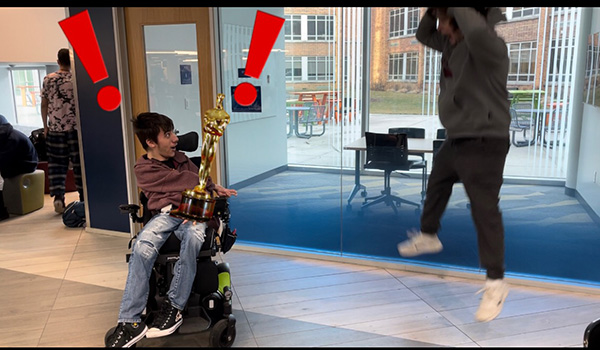Hollywood needs to cast more disabled actors

In an ideal world, disabled actors are recognized for their talents.
For years, Hollywood has incorporated characters with disabilities into their stories to varying degrees of success. While there have been numerous times where it’s done well, it often seems off, and that’s due to the fact that Hollywood rarely casts actors with disabilities of any kind.
Characters with disabilities are often played by an able-bodied person, leaving disabled actors out of a job. When pressed about this, casting directors act like it is a small mistake and that it won’t happen again, except, it does. Using a disabled actor to gain brownie points shows that they’re seen as objects that can be used for a personal gain by the casting directors and studios.
While to many, this may be a trivial issue that is not worth worrying about, the bigger picture is often ignored. For people like me, it’s all about seeing ourselves in the media we watch and how we’re represented. When 95% of characters are played by able-bodied actors according to the Ruderman Foundation, it’s disheartening to me to know that an entire industry would rather take the easy way instead of casting people who are true to these characters they’ve created.
Don’t get me wrong, I know personally that I have limitations and those can create challenges for me and anyone else involved, but that shouldn’t be the reason that disabled actors just aren’t casted. It irks me that limitations and accommodations are seen as a burden by the studio producing a movie or show, but giving an actor millions of dollars is alright when these accommodations are usually cheap or already owned.
More often than not, disabled characters’ disabilities are usually played off as jokes, like Joe Swanson from “Family Guy” or Timmy from “South Park.” The unintentional effect of this is that viewers will think that all disabled are like that, setting back what could be real representation as opposed to exaggerated depictions. While these depictions occasionally are accurate to the life of a disabled person, the inaccurate moments lead people to think that all disabled people are that way.
I can remember the first time I saw a disabled actor play a disabled character, in “Speechless,” which follows a boy named JJ whose family is always searching to give him the best life he can have. The actor who plays JJ, Micah Fowler, has cerebral palsy in real life.
At the time of the show’s release in late 2016, I was a little over 10 years old and I can remember my mom sending me a link to the trailer and feeling so happy that the main character was being played by someone with cerebral palsy. While I don’t have cerebral palsy, it was so exciting to see a proper casting of a disabled person in mainstream media.
Unfortunately though, good depictions of disabled characters played by disabled actors are very uncommon. The last time I remember seeing it done well was in “Titans,” specifically Savanna Welch’s depiction of Barbara Gordon. In real life, Welch has a prosthetic leg, and in the show she plays a character who was paralyzed and is now wheelchair bound. Being a nerd, I thought it was neat that the studio did such an accurate rendition, which is rare to see in anything that’s not realistic fiction.
Here’s the issue– while this is a great step in the right direction, doing the bare minimum shouldn’t be rewarded; it should simply be normalized. By rewarding those who do what should be the normal thing, real change will never occur and this cycle will continue.
In the future, I hope that Hollywood creates more authentic disabled characters, and subsequently casts an actor who has that same disability. When diversity is normalized, anything else will be seen as weird.


